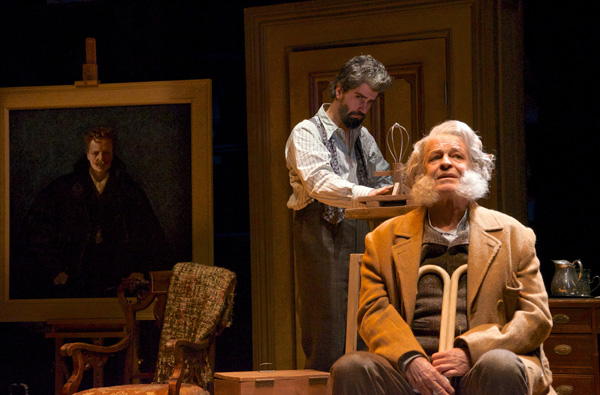Posterity

(© Doug Hamilton)
If Hamilton and The Audience have shown us anything, it's that the private musings and conflicts of famous historical figures are an endless source of fascination for writers and audiences alike. Doug Wright gives us two for the price of one with Posterity, now making its world premiere at Atlantic Theater Company. The play imagines the words shared between Norwegian sculptor Gustav Vigeland and playwright Henrik Ibsen (A Doll's House) when Ibsen sat for a bust in 1901, near the end of his life. While Wright dwells a bit too long on artistic introspection, his observations about legacy are worth this detour, especially as delivered by a stellar cast.
Sculptor Gustav Vigeland (Hamish Linklater) is at the height of his productivity. His studio is lined with floor-to-ceiling shelves populated by veiled busts of wealthy and powerful Norwegians. Yet such portraiture of the privileged does not thrill him. His real passion is for a massive sculpture garden that would capture the full breadth of humanity. As the play begins, his apprentice Anfinn (Mickey Theis) and housekeeper Mrs. Bergstrøm (Dale Soules) pose in the nude for one of the hundreds of scenes in Vigeland's nascent installation. His agent, Larpent (Henry Stram) rudely interrupts this session to inform him of his latest commission at the behest of the cultural ministry: Ibsen. Vigeland is hesitant, but knows that he'll need to curry favor with the government if he's ever to secure funding for his magnum opus.
When Ibsen (John Noble) finally visits the studio wearing a tailored wool topcoat festooned with medals and a pronounced sneer, we immediately understand Vigeland's reservations. Ibsen sees this proposed statue as an insult to his writing (the only monument he'll ever need). One doubts the room will contain his singular ego. Combine it with that of the zealous sculptor and you have the makings of a truly explosive situation.
History and its clashing personalities are never far from Wright's work. He's the author of Quills (a dramatization of the final days of the Marquis de Sade) and the Pulitzer Prize-winning I Am My Own Wife (about the life of German transvestite and antiquarian Charlotte von Mahlsdorf). Posterity is no less imaginative and illuminating than those earlier works, but it has an unfortunate tendency to become entrenched in convoluted dialogue about the nature of art and criticism.
"A critic is to a work of art what a barnacle is to a whale," Ibsen scoffs, before offering ad hominem retorts to each of his detractors (so much for "I barely read them").
"The critics, your peers, your son, even your wife…we're faulty vessels. Bronze is stronger," Vigeland sermonizes, desperately trying to convince Ibsen to sit for the bust.
While this kind of artistic navel-gazing is to be expected when putting a playwright in conversation with a sculptor, it's likely to feel tedious to the casual observer. With lesser actors, Posterity has the potential to be incredibly boring.
Luckily, the denser passages of Wright's text are delivered by Linklater and Noble. These guys could read a transcript from the House Ways and Means Committee and still make it interesting. Linklater needles his scene partner with prosecutorial poise. While nibbling on honey-cake, he calmly produces a gossip column about one of Ibsen's affairs as if it were Exhibit A in the case against him. "You'd refute every rumor, every crass innuendo printed in the scandal sheets," Linklater leads the witness, bruising him with his authoritative baritone.
Noble pushes back with equal vigor. "If only you crafted your figures with the same dexterity as you craft your insults," he jabs (poking Linklater with his cane when words fail). He undergoes a remarkable transformation in the second act from pride to regret. It seems as if he's aged 20 years during the intermission. Despite being Norway's most celebrated writer, this is a man haunted by what he perceives as a deleterious legacy.
Wright (who also directs) has led the entire cast to plausible and captivating performances. With his tidy suit and an air of super-fandom, Stram embodies the politically minded promoter behind Linklater's messy-haired genius. Theis and Soules bring depth to a B plot about the regular folk surrounding these "great men," with Soules offering comic relief as the no-frills housekeeper. Her peasant dress and bonnet looks like they were ripped from an old Dutch painting.
All of Susan Hilferty's costumes have an understated balance of muted color that pops against the mostly beige and grey background of Derek McLane's set. When we enter the theater it almost feels as if we can smell the plaster dust. David Lander illuminates this busy workspace through a natural-feeling skylight, saving his best cue for a powerful moment at the very end.
Even after the lights fade, Wright's words will not. Posterity (and especially Noble's deeply moving performance) is likely to keep more than a few audience members up at night thinking about what they're leaving behind after they're gone.










